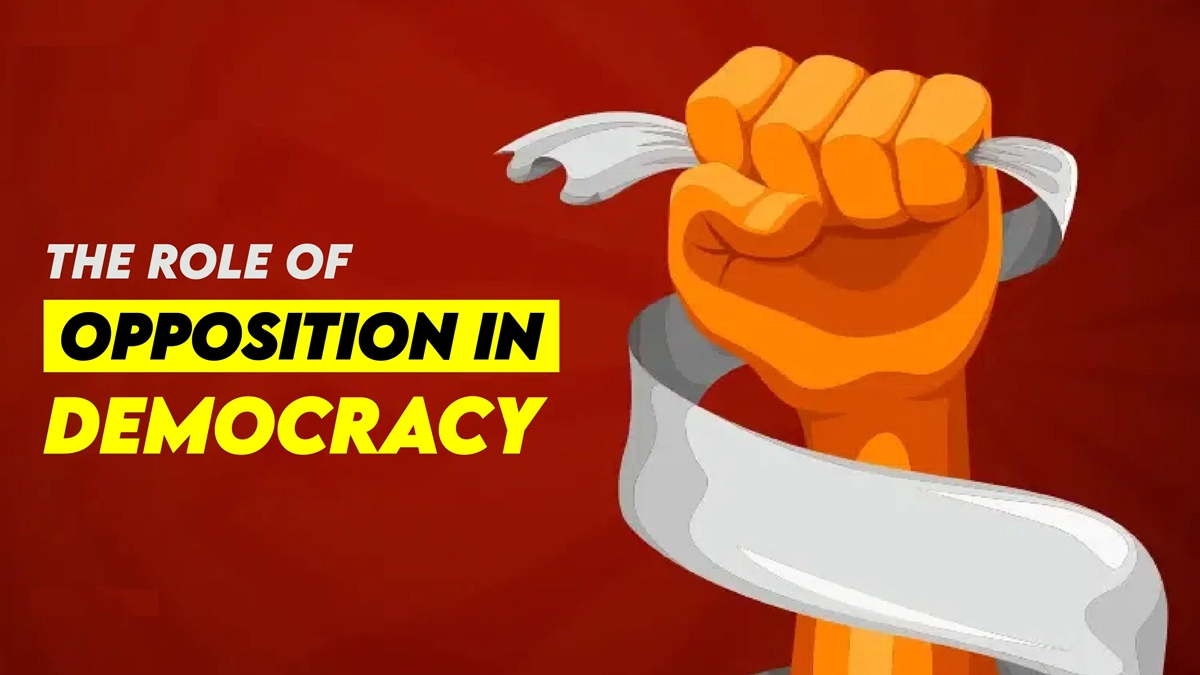In a democracy, the opposition is not only tolerated as constitutional, but must be maintained because it is indispensable.
-Walter Lippmann
A parliamentary democracy is branded by a system of mutual accountability between ruling and opposition party as well as a crucial deliberative process. Parliamentary opposition is an indispensible cornerstone of political system and essential in preserving the true essence of a country’s democracy. It consists of the largest non-government party or coalition of parties elected by the people. These members are not the part of the ruling government but serve as a critical voice in the legislative process. The largest party opposing the government having not less than one-tenth seat of the total strength of the House is the official opposition and its leader is recognised as the leader of the opposition. Leader of the opposition is a statutory post rather than constitutional that got its statutory recognition through Parliament Act 1977. In the past, Indian parliamentary democracy has largely benefited from the novelty and creativity of the parliamentary opposition. The then opposition was significantly connected to powerful social movements such as on unemployment, food grains, land reforms, rights of industrial working class and language rights. However, the structure and operation of Parliament in 18th Lok Sabha have profoundly changed by the emergence of a robust Opposition with 234 seats along with the recognition of the Leader of Opposition, a position that was vacant for a decade.
The function of opposition is not to rule but to enhance stability, legitimacy, accountability and transparency in the political processes. It helps build public opinion against erroneous programmes and policies and critically examines the legislations, policies and actions proposed by the ruling government. It offers democratic political alternatives and improves parliamentary decision-making procedures by ensuring debate, reflection and contradiction on government actions in parliament, committees, media and public. This upholds transparency and accountability of government actions and prevents misuse or transgression of power. The opposition scrutinise the legislative and budgetary proposals of the government and oversee the administration. It also advocates for constituency specific needs, proposes amendments and seeks assurance using parliamentary measures. The opposition acts a bridge between the general public and the government by ensuring that the voices of diverse society with varying interests is heard and addressed thus leading to better governance. By raising public concerns, demands and providing sustained constructive criticism the opposition plays a vital role in maintaining balances of power and a healthy democracy. By highlighting the strengths and weaknesses of government actions and initiatives, the opposition provides necessary checks and balances in the functioning of democracy and helps foster a cooperative political environment.
There has been an abrupt shift in recent years from substantive to disruptive discussions and walk-outs during parliamentary proceedings that obstruct constructive dialogue and legislative progress. Crucial legislations such as farm laws were allegedly approved without critical examination by a dejected opposition and largely circumventing the parliamentary committee system. Division within the opposition where multiple parties have divergent agendas and ideologies can hamper their ability to present a unified opposition narrative and coordinated tactics against the government. Inability of opposition leaders to work together and overcome internal disagreements may impede their collective effectiveness to oppose the ruling party. Also inadequate numerical strength in parliament affects the ability of opposition to secure committee membership, influence legislative outcomes and successfully oppose government policies. Slogans like ‘Congress mukt Bharat’ or ‘Samajvaad Mukt UP’ create politics of enmity where both the government and opposition view each other as rivals and engage in ugly politics. This results in accusations of prejudiced enforcement, electoral malpractice and abuse of official authority to stifle opposition activity. Ultimately it leads to shelving of essential public issues such as inflation, unemployment, poverty etc. and create hurdle in time and resource management. Smaller opposition parties often struggle to mobilise grassroots support and conduct effective electoral campaigns due to financial constraints and limited organisational capacity thus failing to sustain political activities throughout the electoral cycle. With ruling party enjoying better access to mainstream media, opposition parties find it difficult to gain equal visibility in public discourse and spread their agenda and rebut government narrative. Frequent procedural obstacles in parliament such as fewer speaking slots, debate opportunities and dismissal of opposition motions limit the opposition parties in thoroughly examining legislations, proposing amendments and effectively holding the government accountable. A weak opposition is far more damaging than a feeble government and a reckless government along with timid opposition is a perfect recipe for disaster.
The quote “Freedom dies when criticism ends” emphasises the importance of criticism in a democratic setup to sustain liberty. A democratic system is significantly weakened if the opposition does not present any credible alternatives to the governing party, is indiscernible in public deliberation or does not offer a public profile beyond elections season. At the same time, democracy without opposition is dangerous for the society as a whole thus legal recognition of parliamentary opposition and minority rights is essential to promote the idea that democracy can and should be promoted and protected through law. Diversity of opinion enriches the polity and society. Thus, the opposition must learn to gauge nation’s pulse by adopting a more constructive approach through regular interactions, public consultations, town hall meetings and embracing digital platforms to reach wider audience. Opposition parties must strengthen alliances to collectively increase numerical strength, build robust organisational structure and improve grassroots connect. Measures such as state funding, justifiable media access and adopting internal democracy within parties are pivotal for strengthening opposition in India. Electoral reforms that promote fairness, transparency and equitable access to electoral processes will provide a level playing field for political parties. Reinforcing opposition will not only empower political parties but also fortify democratic framework.


Add a Comment